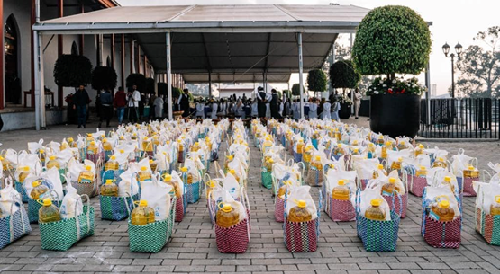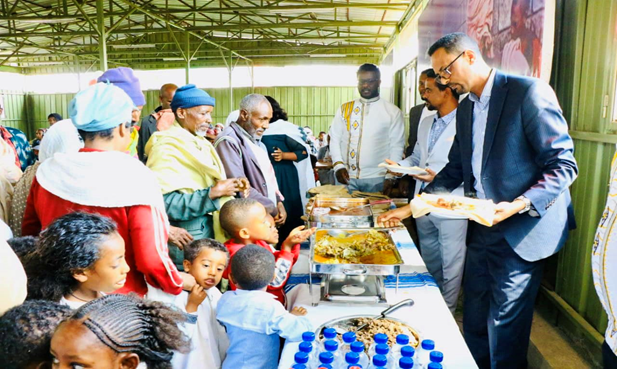
Extending a helping hand for the underprivileged segment of the society is not only a morally obligatory act one should carry out but also a fundamental aspect of building a compassionate and inclusive society. This is especially true in times of holidays where most societies in our community often face greater challenges and hardships.
Helping one another and showing belongingness in times of needs and in special times is one of the cultural values of Ethiopians; they have been practicing it for long. No matter what or in what economic challenges they may be in, or what their cultural and religious differences that exist among them, Ethiopians know the art of sharing.
All holidays have special meaning to Ethiopians. They are not simply special days to feast. They are also moments where Ethiopians show sympathy and belongingness to others.
‘Gena’ which is one of the special festivals for Ethiopians, is a day where they extend their helping hands to the underprivileged members of the society in any possible means, either by sharing meals, donating materials or other way.
As part of this age-old culture of the community, and in relation to the Ethiopian Christmas (Gena) holiday, last Sunday a number of government and non-government institutions and individuals were seen stretching their hands to low income families, elders and the indigent people.
Prime Minister Abiy Ahmed (PhD) and First Lady Zinash Tayachew also marked the day by sharing meals and distributing holiday gifts to the needy, including edible oils and other materials that are needed to celebrate the holiday.
The Premier also handed over 110 houses and 52 shops that were built on two storey modern buildings, to the underprivileged members of the society residing around Aware area.

In the same manner, the Ministry of Health along with its affiliated organizations delivered houses located in Kolfe Keraniyo and Lideta sub-cities to low-income people. The houses are said fully refurbished by the Ministry and its affiliated institutions. They also undertook meal sharing program.
Speaking on the occasion, Health Minister Lia Tadesse (MD) said that the Ministry, concurrent to its core activities undertaken to improving the overall health and wellbeing of the community, it is executing a number of undertakings to discharge its social responsibilities joining hands with affiliating institutions and stakeholders.
“Beyond its primary role of protecting public health, the Ministry is also actively demonstrating its solidarity and togetherness to low-income sections of the society by taking practical strides. This endeavors and commitment will continue in the future too,” the Minister reiterated.
This initiative is aimed at addressing the housing needs of underprivileged individuals and improves their living conditions, she added.
According to her, at this Ethiopian budget year, the renovation activities of a total of 24 houses across different sub-cities are ongoing through the joint efforts of the Ministry and collaborating institutions and stakeholders. Of which six fully refurbished houses were handed over to beneficiaries for Christmas.
The Minister also congratulated beneficiaries and extended her heartfelt thanks to administrators of Kolfe Keranio and Lideta sub cities.
Expressing his satisfaction to see the collective humanitarian efforts accomplished by the Ministry and other stakeholders, Alert Comprehensive Specialized Hospital, Director General Shimelesh Gezahegn (MD), said that Alert Comprehensive Hospital in collaboration with the Ministry of Health, has taken the initiative to address the local community’s problems through the housing project.
Speaking on his part, Kolfe Keraniyo Sub- City, Chief Executive Officer, Negatu Dangchew, commended the Ministry of Health and Alert Comprehensive Specialized Hospital for their active involvement in resolving community challenges. According to him, the dedication of the Ministry and the Hospital is an exemplary to other institutions and serve as a model to improve the lives of the less fortunate members of the society.
It is learnt that the housing project is part of the Ministry’s ongoing volunteer activities, initiated on July 14, 2023, to support low-income individuals.
The holiday season is traditionally a time of joy and celebration, but it can also exacerbate feelings of loneliness and despair for those who are struggling. By reaching out and providing support, we not only alleviate immediate hardships but also send a powerful message of compassion and solidarity.
The act of helping the underprivileged during the holiday season goes beyond charity. It is a reflection of our shared humanity, reminding us that we are all interconnected and have a collective responsibility to uplift those in need. It is a moral duty that enriches both the recipients and the givers, fostering a sense of empathy, gratitude, and social cohesion.
By building new houses and renovating the exhausted ones and delivering as well as providing food assistance to low-income individuals, the Office of Prime Minister, Ministry of Health, other responsible institutions and individuals are actively addressing the pressing needs of those less fortunate Ethiopians. This act of kindness demonstrates government’s commitment to ensuring the well-being and dignity of all citizens.
Moreover, helping the underprivileged during the holiday season has broader societal benefits. When individuals and families have access to stable houses and nutritious meals, they can focus on other areas of their lives, such as education and employment. This, in turn, contributes to stronger and more resilient communities.
Supporting the underprivileged members of the society is moral obligation. Problems associated with poverty cannot be solved in a single day or through sporadic acts of charity. It requires long-term commitment and sustainable solution. This could only be done by combined hands of government, nongovernment organizations and individuals. A one day charitable act might give a relief to beneficiaries; but if it could not bring sustainable change, it may develop a sense of dependency syndrome. In this regard, the effort of the government to bring a sustainable change in the life of underprivileged members of the society by building houses or renovation projects is worth appreciation.
Therefore, it is crucial that the effort should be continued in sustainable manner, not only during the holiday season but throughout the year. Together, we can work towards a more equitable and compassionate society where everyone has the opportunity to thrive.
BY LEULSEGED WORKU
THE ETHIOPIAN HERALD FRIDAY 12 JANUARY 2024





